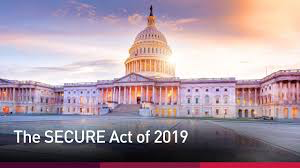In late December 2019, Congress passed the “Setting Every Community Up for Retirement Enhancement Act” (SECURE).
If you have questions about how the new SECURE Act affects your retirement and Section 529 planning, you are not alone.
We’ve received many questions from readers of the Tax Reduction Letter that deal with the impact the SECURE Act will have on their retirement savings plans.
Want to check out what the new law means to you?
Read my new article titled Tax Tips: Eight Answers to Questions About the SECURE Act.

The eight most important questions
readers have about the SECURE Act
Question #1: Do some of the SECURE Act provisions apply to IRA contributions made after December 31, 2019? You’ll get the answer when you read the full article.
Question #2: Will non-spouse traditional IRA beneficiaries pay a lot of tax under the new rule, requiring them to empty the IRA account within 10 years? You’ll get the answer when you read the full article.
Question #3: If I inherit an IRA, and I’m initially subject to the 10-year rule, can I stretch it out later if I become disabled or go into a nursing home? You’ll get the answer when you read the full article.
Question #4: We’re having twins in March 2020. Does this mean my spouse and I can each take $10,000 out of our traditional IRAs, penalty-free? If we want to repay it, what’s the deadline for putting the money back into our IRAs? You’ll get the answers when you read the full article.
Question #5: I’m going to inherit an IRA in 2020 and will have to take the money out over ten years. Can I double-dip and have the 10-year distributions cover my required minimum distributions (RMDs) from my other retirement accounts? You’ll get the answer when you read my new article.
Question #6: If a minor child inherits an IRA, does the IRA become a stretch -IRA permanently? (This seems like a potential tax-planning strategy when determining who should be a beneficiary.) You’ll get the answer when you read the full article.
Question #7: Is the $10,000 Section 529 allowable distribution (for payments of principal and interest on a student loan) an every-year requirement or a lifetime amount? You’ll get the answer when you read the full article.
Question #8: Tax code Section 401(b)(2) states that:
If an employer adopts a stock bonus, pension, profit-sharing, or annuity plan after the close of a taxable year but before the time prescribed by law for filing the return of the employer for the taxable year (including extensions thereof), the employer may elect to treat the plan as having been adopted as of the last day of the taxable year.
Does this rule apply to elective deferrals? You’ll get the answer when you read the full article.